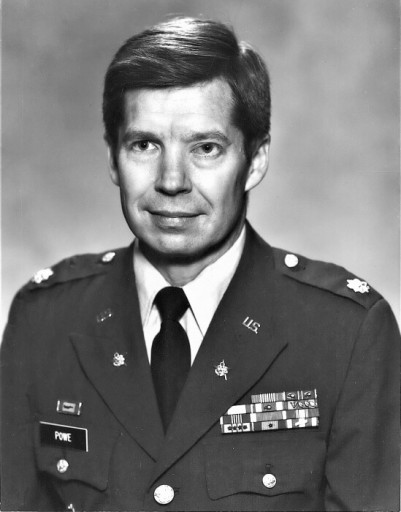

Marc Powe
December 15, 1939 — August 2, 2020
Mansfield
Marc Bracken Powe: Shadow Warrior
December 15, 1939 – August 2, 2020
On August 2, 2020, the nation lost one of the most dedicated, professional, proficient, prolific, and respected career Army Intelligence Officers. Colonel (retired) Marc B. Powe, US Army, died peacefully in Hospice in Mansfield, Texas, after an extended illness with his family visiting as Covid-19 restrictions allowed.
Powe was born in Dallas, Texas, on December 15, 1939. He attended Texas A&M University, earning his bachelor’s degree in history in 1961 and his Master’s at Kansas State University in 1974. Powe’s military education included extensive anti-terrorism training, progressive military education, concluding with the US Army War College, Joint Attaché training, specializing in Counterintelligence and Human Intelligence training, and hostage negotiating management and crisis management through New Scotland Yard. He was also proficient in Russian, German, Vietnamese, Arabic, and French.
Powe served in the U.S. Army for nearly 30 years as a Military Intelligence officer with early assignments in Germany and two tours in Vietnam. Powe was selected as the V Corps CI agent assigned to protect Attorney General Robert Kennedy (post his brother's assassination) during Kennedy's tour of a combat corps readiness in Germany. While in Vietnam, on his first tour, Powe served as a Province Intelligence Advisor in Me Tho in the Mekong River Delta to assist the Vietnamese Army. On his second tour, he served as the Commander of the MI company supporting the 4th Infantry Division in combat operations. While flying in a Mohawk recon aircraft, as a combat aerial observer, both he and his pilot were hit and injured by antiaircraft fire from the Viet Cong that shattered the canopy. (Though badly injured, the pilot heroically made an emergency landing back in friendly territory). Powe earned an Air Medal w/ V device and a Purple Heart.
He served multiple tours as a military attaché stationed in our embassies in Moscow, Baghdad (before Gulf Wars), and Tunisia. For the Moscow tour, he served as the first-ever operations officer for the largest U.S. Defense Attaché Office (DAO) in the world. Coincidentally, Powe was the first Defense Attaché (DATT) to serve in the newly re-opened Baghdad Embassy.
In 1977, Powe was awarded the Soldier’s Medal, the Army’s highest award for courage in a non-combat situation, for his actions during a major fire at the U.S. Embassy in Moscow.
Describing his actions, the U.S. ambassador wrote that then-Major Powe “distinguished himself by heroism… directing efforts of ensuring the security and protection against compromise of extremely sensitive classified areas …for over three hours, with complete disregard for his own safety [and] successfully prohibited the access of foreign personnel into the classified areas of the upper floors of the Embassy.”
By November of 1979, following drastic strategic surprises, i.e., the seizure of the US Embassy in Tehran, rioters burning US Embassy Islamabad, seizure of the Grand Mosque in Mecca by Islamic radicals, followed by the Soviet invasion in Afghanistan, Powe was selected by the Army to prepare an analysis and a pioneering course of action plan for our intelligence community and the Department of Defense, including the Army’s Delta Force and Joint Special Operations Command.
In 1988, Powe led the U.S.’s acquisition of a much sought-after intact, airworthy Russian Hind-25 attack helicopter. He negotiated with the Chadians for the purchase of the helicopter and was on the ground for its clandestine extraction and transport to the United States by US Army and US Air Force forces using CH-47 helicopters and a C-5 transport. In the YouTube production called, “The Hind Heist: The Secret US Operation to Steal the Soviet’s Top Helicopter” (https://www.youtube.com/watch?v=dPz7O8JgUhs&t=15s), both the history of the helicopter and the urgency to obtain it are superbly detailed. But the story of how one lone man in a Chadian desert, striking a deal with extremely dangerous individuals to drag and then hide something so large, is summed up in the ninth minute of the video: an unknown man, dressed in civilian white shirt and baseball cap, briefly seen looking incredibly satisfied; yet Powe would simply remark, “I arranged for a series of C-5 flights to provide lift of the Soviet material as I released funds to the Chadians.” It was also during that time that Powe “acquired” a Chinese anti-ship missile at the behest of the US Navy.
As an accredited Attaché with diplomatic immunity, he was detected, arrested, and questioned for aggressive observation of secret illegal Russian deliveries of arms equipment to Iraq through Kuwait in 1988. It would be 30 years later that the details of his arrest were made known to his family: that as the Kuwait police spotted Powe, who had pulled over to document the illegal shipment of arms from the Soviets, Powe calmly exposed all his film, then ate his notes. Powe had just enough time to swallow his intel before being detained, and in custody feigned illness to speed up the high-level negotiations for his release. Powe dismissed the incident as routine, but it was important enough news to be reported as "The Powe Affair" in US News and Reports.
In 1990, Powe was called upon to “use relations” to attempt influence of “certain events” related to the Gulf War, for which he received a “private” award but also received his second DCI Exceptional Intelligence Collector award.
Yet another legacy of Powe is his influence on the field of Army Intelligence. Following the publication of a book he co-authored with Col. E.E. Wilson, Evolution of American Military Intelligence, which remains the foundation of military intelligence history, countless Army Intelligence officers have stated it was the catalyst to their careers and patriotism. Today, Powe’s works and research reside with the U.S. Army Military Intelligence Center of Excellence historical archive and are known as “the Powe Collection.”
Powe retired from the Army in 1992 and went to work at UNICEF in New York City as first-ever Field Security Manager, setting up their first true operations center and managing thousands of staff and contractors in 130 countries. He traveled to every nation in Africa at least once, walking into refugee camps and among the Hutus and Tutsis following the 1994 Rwanda massacre, and worked to keep fellow peacekeepers safe in the regions of Somalia, Kenya, Tanzania, etc., where civil unrest and/or drug lords posed imminent danger.
He would return to the Office of Secretary of Defense for African Affairs at the Pentagon where he was working when American Airlines flight #77 hit the Pentagon on September 11, 2001, and he was one of the first out the door to help the injured.
For Powe, both personally and professionally, one of his more interesting assignments was his time with the Joint Improvised Explosive Device Defeat Organization (JIEDDO). His time there was spent in aiding and understanding the threat in the Near East and in protecting U.S. personnel deployed in harm’s way in Afghanistan and elsewhere in that region. Powe had a deeply-held sense of mission to defeat the IED attacks and the growing effect of ISIS/Al Qaeda/Taliban threats.
Powe was a primary planner in the Office of the Secretary of Defense for the post combat operations for the Iraqi war protracted armed conflict that began in 2003 with the invasion of Iraq by a United States-led coalition that overthrew the government of Saddam Hussein. He was one of the first civilian cadre in country post combat and worked to repair the Iraqi police and Army as a province advisor.
Powe had a long history and association with the Defense Intelligence Agency. His last duty assignment was as the Chief of Staff of the Directorate of Operations, DIA and much of his work as an attaché and field collector over the years had links to DIA. He also was a “consultant” to selected DIA activities.
For his military service, Colonel Powe was awarded the Defense Superior Service Medal w/ 1OLC, Legion of Merit, Soldier’s Medal, Bronze Star Medal w/ 2OLC, Purple Heart, Defense Meritorious Service Medal w/ 2OLC, Meritorious Service Medal w/ 2OLC, Air Medal (4), Air Medal w/ V Device, Army Commendation Medal, Army Achievement Medal, National Defense Service Medal with Bronze Star, Vietnam Service Medal (5), Army Service Ribbon, Overseas Service Ribbon (3), Vietnam Campaign Medal, and Army Staff Identification Badge. From the Intelligence community, he received the Director of Central Intelligence Exceptional Collector Award in 1986 and 1990. He was also recognized with the UNICEF Staff Award for Outstanding Performance in Emergency Operations. He was a Department of Defense Attaché Hall of Fame inductee and received the Department of Defense Exceptional Civilian Service Award.
He remained steadfast in his mission to protect his country supported by his wife, Karen, who as a mirroring patriot ultimately got a picture of the underbelly of a Soviet tank in Moscow in 1979. She succumbed to Alzheimer’s in 2017.
Powe would become a legend at the Isle of Watercrest memory care unit in Mansfield, Texas, where the entire staff fell in love with the former counterintelligence officer who continued to escape in ways and for which the director, administration, staff, and caregivers had no explanation. Powe escaped from windows, doors, locked stairwells, changed protocol on resident checks, where fire extinguishers were stored, and how doors were locked. Known to family members of other residents as “Jason Bourne, Sr.,” the “Colonel” could not be held back.
Marc B. Powe will be remembered and mourned by family, superiors, subordinates, students, and a legion of friends he knew in his professional, intelligence, teaching, and civilian careers. He was an outstanding soldier, superb intelligence collector and reporter. His forte, honed by experience and a stint as a reporter for the Dallas Morning News, was finding and collecting information, reporting it prolifically, accurately, and in a timely manner, for which he earned his reputation. His reports formed the basis for the intelligence decision-makers needed, for reviewing and analyzing problems (and opportunities), and for conducting unique, clever intelligence operations. It was best summed up by a former colleague from the Pentagon that Marc B. Powe was “the best of us … a Shadow Warrior who served this nation.” That he did.
He is survived by his daughters Michelle Powe and Alexandra Powe Allred. He is also survived by his brothers, Chris and Stephen Powe; sister Diana Powe; grandchildren Kerri Allred Beckman, Katie Allred, and Thomas B. Allred; son-in-law Robb Allred; grandson-in-law Kyle Beckman; and great-granddaughter Eleanor Beckman; as well as two nieces and three nephews of whom he was immensely proud.
Colonel Powe will be interred at the Arlington Cemetery in Virginia with full honors in 2021. Due to COVID-19, the family respectfully postponed his funeral so that his peers, friends, and family might all attend.
Please note: Any contributions or donations should be made to the Vietnam Veterans of America in the name of Col (ret) Marc B. Powe, US Army, and will be greatly appreciated as the work of VVA is so important.
Vietnam Veteran of America
8719 Colesville Road Suite 100
Silver Spring, MD 20910
Attn.: Donation
Or
www.vva.org
Guestbook
Visits: 21
This site is protected by reCAPTCHA and the
Google Privacy Policy and Terms of Service apply.
Service map data © OpenStreetMap contributors



